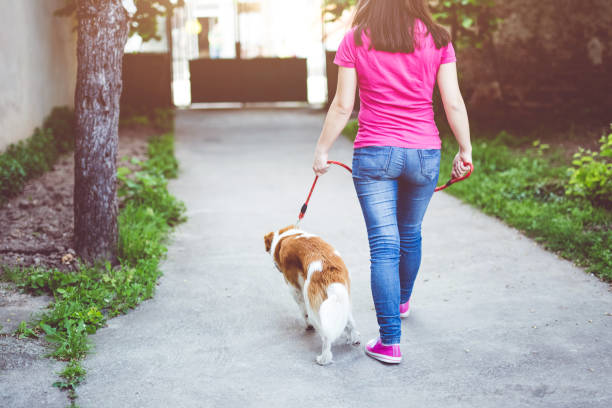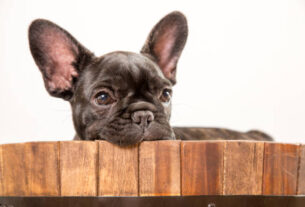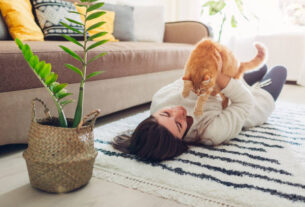Walking your pup can be one of the best parts of having a furry friend in your life, but when you are walking them in public spaces, it is essential to stay considerate and respectfully aware of other people.
Dog walking etiquette can help build better relationships with those in our neighbourhoods who may not always be as excited at the sight of a four-legged friend.
Let’s explore ways we can use little things like being mindful about where our pet poops, leashing up correctly, and paying attention to others’ peace while out for a walk that make all the difference.
Page Contents
Why Dog Walking Etiquette Matters
As a dog lover, you know that spending time with our furry friends is one of the greatest joys in life. But when it comes to walking our pups, it’s important to remember that not everyone feels the same way.
That’s why practicing good dog walking etiquette is so crucial. Being mindful of other dogs & pet parents, using common courtesy, and respecting the space of those who aren’t interested in dogs can make all the difference in ensuring that everyone has a positive experience.
Next time you’re out and about with your pup, remember that a little kindness goes a long way. By being considerate of others, we can all enjoy our time together with our furry friends without discomforting others.
Do I Need A License To Dog Walk In The UK?
If you’re thinking of walking your furry friend around the UK, you might be wondering if you need a license to do so.
The good news is that you don’t need a specific license to walk your dog, but you do need to be a responsible owner.
This means following leash laws in public areas and being respectful of private property where dogs may not be welcome.
While it may seem simple, being a responsible dog owner involves more than just taking your pup for a walk, as we’ll discover shortly.
By being a responsible owner, you’ll not only be keeping your furry friend safe, but you’ll also be contributing to a more dog-friendly community.
Keep Your Dog On A Lead
When it comes to walking your dog around the neighbourhood, it’s important to keep them on a lead.
Whether you use a traditional leash or a retractable leash, keeping your furry friend close by ensures their safety and the safety of others around you.
While it may be tempting to let your dog run off leash, it’s important to remember that this isn’t appropriate in built up areas with people and vehicle traffic.
Not only is it considered poor etiquette, but it can be dangerous for both your dog and those around you.
Ultimately, it just comes down to common sense: be a good neighbour and keep your dog close by on walks.
Pick Up Your Dog’s Poop
As a responsible dog owner, picking up your dog’s poop with good quality poo bags is not only good etiquette, but also helps keep our environment clean and healthy.
Make sure you always have eco-conscious poop bags with you on walks or trips to the park, so you can easily clean up after your furry friend.
Not only does it prevent others from stepping in it, but using biodegradable poo bags also helps keep our waterways and green spaces free of waste & microplastics.
Plus, practicing good potty training habits with your dog can lead to a cleaner and happier home overall. So let’s all do our part and make sure we pick up after our four-legged friends.
Dealing With Encounters With Other Dogs And People On Walks
Going for a walk with our beloved furry friends can be an enjoyable bonding experience, but it can quickly turn into a stressful experience if you’re unprepared for encountering other dogs and people on the way.
One crucial strategy is to have control over our dogs by training them to be obedient, keeping them on a leash, and teaching them basic commands like ‘heel’ and ‘come.’
If we see another dog and you’re not sure how it will act, the best way to approach it is to cross the street to the other side and give it some space.
If other dog walkers approach us, it’s important to be courteous and respectful to them, ensuring both dogs interact safely and appropriately. By following these tips, we can ensure enjoyable walks for everyone.
Keep A Close Eye On Play
As much as we love our four-legged friends, it’s important to keep in mind that not all dogs have the same play style.
Being aware of your dog’s body language when playing with other dogs is key to ensuring good etiquette. Keep a close eye on how your dog is interacting with other dogs, and call them back if they seem overly aggressive or intimidated.
And don’t forget that not all dogs like to play the same way – some prefer chasing and wrestling while others enjoy more gentle interactions.
By paying attention to your dog’s behaviour and respecting the boundaries of others, you’ll help ensure that everyone has a fun and safe time playing together.
Do Not Let Them Jump
One key aspect of dog walking etiquette is preventing your dog from jumping up at people or other dogs. While most dogs are friendly and love to greet others, jumping up can be intimidating and potentially dangerous for those around them.
By teaching your dog not to jump up, you can help keep them and others safe and create a positive walking experience for everyone involved. Let’s all work towards keeping our furry friends well-behaved and happy on their daily walks!
Keep Your Dog Off Other People’s Lawns
One way to ensure you keep your neighbours happy is by keeping your dog off other people’s lawns, especially those with prized garden ornaments or freshly-mowed grass strips.
When out for a walk with your dog, make sure to bring plenty of poo bags in case there are any accidents and keep them on a shorter leash near people’s gardens.
This will not only show consideration for your neighbours but also keep your dog safe from potential hazards like poisonous plants or fertilizers.
Remember, a little consideration goes a long way when it comes to keeping the peace in your neighbourhood.

Lois Lane is a professional blogger and a seasoned Content writer for wellhousekeeping.com. With a passion for simplifying complex Home Decor topics, he provides valuable insights to a diverse online audience. With four years of experience, Lois has polished his skills as a professional blogger.




